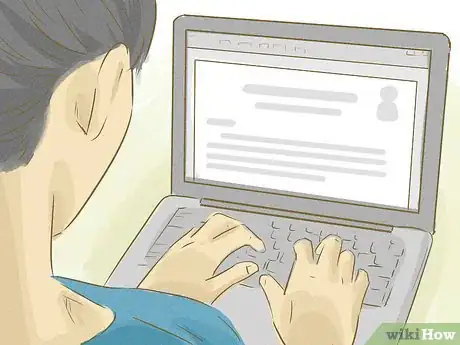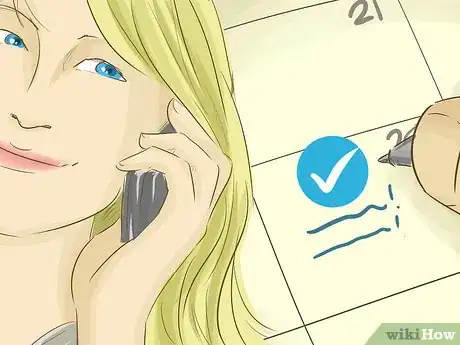X
This article was co-authored by Tasha Rube, LMSW. Tasha Rube is a Licensed Social Worker based in Kansas City, Kansas. Tasha is affiliated with the Dwight D. Eisenhower VA Medical Center in Leavenworth, Kansas. She received her Masters of Social Work (MSW) from the University of Missouri in 2014.
This article has been viewed 27,199 times.
Seeing a psychologist can be a hugely helpful investment of your time, energy, and funds. Search wisely and find a psychologist who feels like the right fit for you. Look for candidates with expertise in your situation, and stick with the one who makes you feel the most comfortable.
Steps
Part 1
Part 1 of 3:
Locating Psychologists
-
1Ask your physician. If you like and trust your doctor, ask her to recommend a therapist who also works with your insurance. Your doctor be able to point you to someone with whom she has had positive experiences in the past.[1]
-
2Check the APA listings. The American Psychologist Association Practice Organization keeps a list of all members in the United States and Canada. Their listings include helpful information, such as areas of specialization and types of insurance accepted.
- Use their search engine to locate a psychologist near you: http://locator.apa.org/?_ga=1.228288861.1120636416.1459691634
Advertisement -
3Contact nearby mental health associations. Look up the psychological associations in your area and your state. Ask for listings from universities in your area, or college psychology departments. Find your local community mental health center and see what services they offer.
- Some institutes have a director who will meet with you to determine what counselor might be a good match for you.[2]
-
4Get a recommendation. Ask friends and family if they know of any good psychologists. Often, you will have friends who went to someone in the past and had a good experience, or friends who know friends who were helped by someone. However, don't try to get the same psychologist as someone close in your life. In some cases, a psychologist may refuse to take you on as a client if you have a close relationship with another client.
- Ask your friends who have a good psychologist if you can get a referral from their psychologist. Your friends' psychologist will likely be happy to refer you to colleagues they find qualified.[3]
Advertisement
Part 2
Part 2 of 3:
Finding Good Candidates
-
1Search for a psychologist with the right expertise. Look for someone who has experience working with clients in your situation. Psychologists tend to concentrate on certain age groups or kinds of issue. Your candidates may have areas of interest listed on their website or wherever they are listed, or you may have to ask.[4]
- You may be interested in working with a psychologist who has experience with your age group.
- Some psychologists specialize in treating queer youth, or the elderly, or families.
- If you will need your psychologist to perform functions for you outside of individual sessions, such as testifying in court, make sure your psychologist has experience. Find someone who has expertise in custody battles, for instance, if you are about to enter divorce.[5]
- If you can't find information on your candidate's website, ask "What sort of experience do you have working with clients who are/who struggle with/who would like to…"
-
2Check your candidates' credentials. At a minimum, a good psychologist will be licensed by the state or jurisdiction they practice in. This is a license that is only renewed for psychologists who demonstrate competence and adherence to professional ethics.[6]
- Psychologists have doctoral degrees, so you should find a "PhD" noted after the name of any psychologist you are considering.
-
3Consider cost. Psychologists charge variable rates, so find one who you can afford to stay with as long as you need. If you have health insurance, your insurance may cover some of the costs of care. If you don't, or if your health insurance won't cover your mental health needs, you may find yourself paying between 100-250 out of pocket for a session. However, there are ways to find a psychologist you can afford: don't give up just because the initial costs seem high.[7]
- Many psychologists work on a sliding scale. Explain that your funds are limited, and ask for a low hourly rate.
- Ask for a cash discount. Some psychologists will give you a discount if you can pay in cash instead of by card or check.
- Ask your insurer for the list of psychologists in your area who are covered by your insurance, or search for mental health practitioners on your insurance company's website.
- If your insurance doesn't mention psychologists, ask what they do cover. Some policies may include social workers, for instance.
- Contact a community mental health center for free or low-cost services.[8]
Advertisement
Part 3
Part 3 of 3:
Finding a Match
-
1Call and ask questions. Pick 2-5 psychologists and give them a call. Take notes as you ask your questions. Consider writing the questions down first (or making a spreadsheet) so you can scribble the answer quickly as you speak.
- Ask about licensure, years of experience, and areas of expertise.
- Explain how you have been feeling (worried, sad, like nothing, angry), any problems you have been having at home, work, or with yourself, and any diagnoses you have been given. Ask what experience the psychologist has with this type of problem.
- Ask what kind of treatments they use, and if they have been effective for people in your situation.
- Don't forget to ask about fees and insurance! Ask about this on the phone: being as upfront as possible about money will help you find the right fit.
- If you feel like you have the right fit, make a trial appointment right then. If you need time to process, thank them and say you'll call back about an appointment.
- After you finish each phone call, make a note or two about how it felt to talk to the psychologist in question. It may likely feel awkward to speak over the phone, but if it felt hostile or uncomfortable you can cross that psychologist off your list.
-
2Set up trial meetings. Make appointments with the psychologists you spoke to who seemed like a good match. You may want to do this one at a time, or you may want to make several first meetings and compare them all.
- Take notes after your meetings so you can keep your options straight.
-
3Check in with how you feel. After you have had a first meeting with a psychologist, check in with your feelings. You don't have to feel "cured" or even better after meeting with a psychologist for the first time, but ask yourself if you felt comfortable speaking with them. Did you feel like your psychologist listened to you?[9]
- It's great if you feel relieved or hopeful, but these feelings may take many meetings to come.
- If you aren't sure how you feel, it's fine to continue seeing a psychologist until you are sure you like them or until you have found another option.
- If you meet a psychologist you think is competent, but who doesn't feel like the right match, explain why not and ask them for a referral to someone who may be a better fit for you.
Advertisement
References
- ↑ http://www.apa.org/helpcenter/choose-therapist.aspx
- ↑ https://www.psychologytoday.com/blog/freudian-sip/201102/how-find-the-best-therapist-you
- ↑ https://www.psychologytoday.com/blog/freudian-sip/201102/how-find-the-best-therapist-you
- ↑ http://www.apa.org/helpcenter/choose-therapist.aspx
- ↑ http://www.apa.org/topics/ethics/potential-violations.aspx
- ↑ https://www.helpguide.org/articles/mental-health/finding-a-therapist-who-can-help-you-heal.htm
- ↑ http://psychcentral.com/blog/archives/2012/12/04/what-to-do-when-you-cant-afford-therapy/
- ↑ http://www.apa.org/helpcenter/choose-therapist.aspx
- ↑ http://www.apa.org/helpcenter/choose-therapist.aspx
About This Article
Advertisement


























































